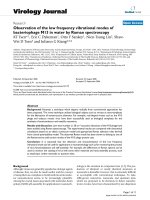The Project Gutenberg E Book of Jean Christophe: In Paris, by Romain Rolland docx
Bạn đang xem bản rút gọn của tài liệu. Xem và tải ngay bản đầy đủ của tài liệu tại đây (2.48 MB, 1,425 trang )
The Project Gutenberg EBook of Jean
Christophe: In Paris, by Romain Rolland
Copyright laws are changing all over the
world. Be sure to check the copyright
laws for your country before downloading
or redistributing this or any other Project
Gutenberg eBook.
This header should be the first thing seen
when viewing this Project Gutenberg file.
Please do not remove it. Do not change or
edit the header without written
permission.
Please read the "legal small print," and
other information about the eBook and
Project Gutenberg at the bottom of this
file. Included is important information
about your specific rights and restrictions
in how the file may be used. You can also
find out about how to make a donation to
Project Gutenberg, and how to get
involved.
**Welcome To The World of Free Plain
Vanilla Electronic Texts**
**eBooks Readable By Both Humans and
By Computers, Since 1971**
*****These eBooks Were Prepared By
Thousands of Volunteers!*****
Title: Jean Christophe: In Paris The
Market-Place, Antoinette, The House
Author: Romain Rolland
Release Date: May, 2005 [EBook #8149]
[Yes, we are more than one year ahead of
schedule] [This file was first posted on
June 20, 2003]
Edition: 10
Language: English
*** START OF THE PROJECT
GUTENBERG EBOOK JEAN
CHRISTOPHE: IN PARIS ***
Produced by Distributed Proofreaders.
JEAN-CHRISTOPHE
In Paris
The Market-Place, Antoinette, The House
by Romain Rolland
Translated by Gilbert Cannan
CONTENTS
THE MARKET-PLACE
ANTOINETTE
THE HOUSE
THE MARKET-
PLACE
I
Disorder in order. Untidy officials
offhanded in manner. Travelers protesting
against the rules and regulations, to which
they submitted all the same. Christophe
was in France. After having satisfied the
curiosity of the customs, he took his seat
again in the train for Paris. Night was over
the fields that were soaked with the rain.
The hard lights of the stations accentuated
the sadness of the interminable plain
buried in darkness. The trains, more and
more numerous, that passed, rent the air
with their shrieking whistles, which broke
upon the torpor of the sleeping passengers.
The train was nearing Paris.
Christophe was ready to get out an hour
before they ran in; he had jammed his hat
down on his head; he had buttoned his
coat up to his neck for fear of the robbers,
with whom he had been told Paris was
infested; twenty times he had got up and
sat down; twenty times he had moved his
bag from the rack to the seat, from the seat
to the rack, to the exasperation of his
fellow-passengers, against whom he
knocked, every time with his usual
clumsiness.
Just as they were about to run into the
station the train suddenly stopped in the
darkness. Christophe flattened his nose
against the window and tried vainly to
look out. He turned towards his fellow-
travelers, hoping to find a friendly glance
which would encourage him to ask where
they were. But they were all asleep or
pretending to be so: they were bored and
scowling: not one of them made any
attempt to discover why they had stopped.
Christophe was surprised by their
indifference: these stiff, somnolent
creatures were so utterly unlike the French
of his imagination! At last he sat down,
discouraged, on his bag, rocking with
every jolt of the train, and in his turn he
was just dozing off when he was roused
by the noise of the doors being opened….
Paris!… His fellow-travelers were
already getting out.
Jostling and jostled, he walked towards
the exit of the station, refusing the porter
who offered to carry his bag. With a
peasant's suspiciousness he thought every
one was going to rob him. He lifted his
precious bag on to his shoulder and
walked straight ahead, indifferent to the
curses of the people as he forced his way
through them. At last he found himself in
the greasy streets of Paris.
He was too much taken up with the
business in hand, the finding of lodgings,
and too weary of the whirl of carriages
into which he was swept, to think of
looking at anything. The first thing was to
look for a room. There was no lack of
hotels: the station was surrounded with
them on all sides: their names were flaring
in gas letters. Christophe wanted to find a
less dazzling place than any of these: none
of them seemed to him to be humble
enough for his purse. At last in a side
street he saw a dirty inn with a cheap
eating-house on the ground floor. It was
called Hôtel de la Civilisation. A fat man
in his shirt-sleeves was sitting smoking at
a table: he hurried forward as he saw
Christophe enter. He could not understand
a word of his jargon: but at the first glance
he marked and judged the awkward
childish German, who refused to let his
bag out of his hands, and struggled hard to
make himself understood in an incredible
language. He took him up an evil-smelling
staircase to an airless room which opened
on to a closed court. He vaunted the
quietness of the room, to which no noise
from outside could penetrate: and he
asked a good price for it. Christophe only
half understood him; knowing nothing of
the conditions of life in Paris, and with his
shoulder aching with the weight of his
bag, he accepted everything: he was,
eager to be alone. But hardly was he left
alone when he was struck by the dirtiness
of it all: and to avoid succumbing to the
melancholy which was creeping over him,
he went out again very soon after having
dipped his face in the dusty water, which
was greasy to the touch. He tried hard not
to see and not to feel, so as to escape
disgust.
He went down into the street. The October
mist was thick and keenly cold: it had that
stale Parisian smell, in which are mingled
the exhalations of the factories of the
outskirts and the heavy breath of the town.
He could not see ten yards in front of him.
The light of the gas-jets flickered like a
candle on the point of going out. In the
semi-darkness there were crowds of
people moving in all directions. Carriages
moved in front of each other, collided,
obstructed the road, stemming the flood of
people like a dam. The oaths of the
drivers, the horns and bells of the trams,
made a deafening noise. The roar, the
clamor, the smell of it all, struck fearfully
on the mind and heart of Christophe. He
stopped for a moment, but was at once
swept on by the people behind him and
borne on by the current. He went down the
Boulevard de Strasbourg, seeing nothing,
bumping awkwardly into the passers-by.
He had eaten nothing since morning. The
cafés, which he found at every turn,
abashed and revolted him, for they were
all so crowded. He applied to a
policeman; but he was so slow in finding
words that the man did not even take the
trouble to hear him out, and turned his
back on him in the middle of a sentence
and shrugged his shoulders. He went on
walking mechanically. There was a small
crowd in front of a shop-window. He
stopped mechanically. It was a photograph
and picture-postcard shop: there were
pictures of girls in chemises, or without
them: illustrated papers displayed
obscene jests. Children and young girls
were looking at them calmly. There was a
slim girl with red hair who saw
Christophe lost in contemplation and
accosted him. He looked at her and did
not understand. She took his arm with a
silly smile. He shook her off, and rushed
away, blushing angrily. There were rows
of café concerts: outside the doors were
displayed grotesque pictures of the
comedians. The crowd grew thicker and
thicker. Christophe was struck by the
number of vicious faces, prowling rascals,
vile beggars, painted women sickeningly
scented. He was frozen by it all.
Weariness, weakness, and the horrible
feeling of nausea, which more and more
came over him, turned him sick and giddy.
He set his teeth and walked on more
quickly. The fog grew denser as he
approached the Seine. The whirl of
carriages became bewildering. A horse
slipped and fell on its side: the driver
flogged it to make it get up: the wretched
beast, held down by its harness, struggled
and fell down again, and lay still as
though it were dead. The sight of it—
common enough—was the last drop that
made the wretchedness that filled the soul
of Christophe flow over. The miserable
struggles of the poor beast, surrounded by
indifferent and careless faces, made him
feel bitterly his own insignificance among
these thousands of men and women—the
feeling of revulsion, which for the last
hour had been choking him, his disgust
with all these human beasts, with the
unclean atmosphere, with the morally
repugnant people, burst forth in him with
such violence that he could not breathe.
He burst into tears. The passers-by looked
in amazement at the tall young man whose
face was twisted with grief. He strode
along with the tears running down his
cheeks, and made no attempt to dry them.
People stopped to look at him for a
moment: and if he had been able to read
the soul of the mob, which seemed to him
to be so hostile, perhaps in some of them
he might have seen—mingled, no doubt,
with a little of the ironic feeling of the
Parisians for any sorrow so simple and
ridiculous as to show itself—pity and
brotherhood. But he saw nothing: his tears
blinded him.
He found himself in a square, near a large
fountain. He bathed his hands and dipped
his face in it. A little news-vendor
watched him curiously and passed
comment on him, waggishly though not
maliciously: and he picked up his hat for
him—Christophe had let it fall. The icy
coldness of the water revived Christophe.
He plucked up courage again. He retraced
his steps, but did not look about him: he
did not even think of eating: it would have
been impossible for him to speak to
anybody: it needed the merest trifle to set
him off weeping again. He was worn out.
He lost his way, and wandered about
aimlessly until he found himself in front of
his hotel, just when he had made up his
mind that he was lost. He had forgotten
even the name of the street in which he
lodged.
He went up to his horrible room. He was
empty, and his eyes were burning: he was
aching body and soul as he sank down into
a chair in the corner of the room: he
stayed like that for a couple of hours and
could not stir. At last he wrenched himself
out of his apathy and went to bed. He fell
into a fevered slumber, from which he
awoke every few minutes, feeling that he
had been asleep for hours. The room was
stifling: he was burning from head to foot:
he was horribly thirsty: he suffered from
ridiculous nightmares, which clung to him
even after he had opened his eyes: sharp
pains thudded in him like the blows of a
hammer. In the middle of the night he
awoke, overwhelmed by despair, so
profound that he all but cried out: he
stuffed the bedclothes into his mouth so as
not to be heard: he felt that he was going
mad. He sat up in bed, and struck a light.
He was bathed in sweat. He got up,
opened his bag to look for a handkerchief.
He laid his hand on an old Bible, which
his mother had hidden in his linen.
Christophe had never read much of the
Book: but it was a comfort beyond words
for him to find it at that moment. The Bible
had belonged to his grandfather and to his
grandfather's father. The heads of the
family had inscribed on a blank page at
the end their names and the important
dates of their lives—births, marriages,
deaths. His grandfather had written in
pencil, in his large hand, the dates when
he had read and re-read each chapter: the
Book was full of tags of yellowed paper,
on which the old man had jotted down his
simple thoughts. The Book used to rest on
a shelf above his bed, and he used often to
take it down during the long, sleepless
nights and hold converse with it rather
than read it. It had been with him to the
hour of his death, as it had been with his
father. A century of the joys and sorrows
of the family was breathed forth from the
pages of the Book. Holding it in his hands,
Christophe felt less lonely.
He opened it at the most somber words of
all:
_Is there not an appointed time to man
upon earth? Are not his days also like the
days of an hireling?
When I lie down, I say, When shall I arise
and the night be gone? and I am full of
tossings to and fro unto the dawn of the
day.
When I say, My bed shall comfort me, my
couch shall ease my complaint, then Thou
searest me with dreams and terrifiest me
through visions…. How long wilt Thou
not depart from me, nor let me alone till I
swallow down my spittle? I have sinned;
what shall I do unto Thee, O Thou
preserver of men?
Though He slay me yet will I trust in
Him._
All greatness is good, and the height of
sorrow tops deliverance. What casts
down and overwhelms and blasts the soul
beyond all hope is mediocrity in sorrow
and joy, selfish and niggardly suffering
that has not the strength to be rid of the
lost pleasure, and in secret lends itself to
every sort of degradation to steal pleasure
anew. Christophe was braced up by the
bitter savor that he found in the old Book:
the wind of Sinai coming from vast and
lonely spaces and the mighty sea to sweep
away the steamy vapors. The fever in
Christophe subsided. He was calm again,
and lay down and slept peacefully until
the morrow. When he opened his eyes
again it was day. More acutely than ever
he was conscious of the horror of his
room: he felt his loneliness and
wretchedness: but he faced them. He was
no longer disheartened: he was left only
with a sturdy melancholy. He read over
now the words of Job:
Even though God slay me yet would I
trust in Him.
He got up. He was ready calmly to face
the fight.
He made up his mind there and then to set
to work. He knew only two people in
Paris: two young fellow-countrymen: his
old friend Otto Diener, who was in the
office of his uncle, a cloth merchant in the
Mail quarter: and a young Jew from
Mainz, Sylvain Kohn, who had a post in a
great publishing house, the address of
which Christophe did not know.
He had been very intimate with Diener
when he was fourteen or fifteen. He had
had for him one of those childish
friendships which precede love, and are
themselves a sort of love. [Footnote: See
Jean-Christophe—I: "The Morning."]









